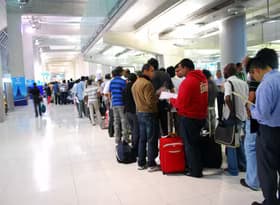Too hard to define child poverty, so let’s just pay everyone
Child poverty is an emotive issue, and one that Labour has seized on in its new policy announcements in the last week. Quotes from David Cunliffe like “one in four of our kids is growing up below the poverty line, and one in five don’t even have two pairs of shoes to wear to school” successfully attract media and voter attention because equality of opportunity is a principle that everyone can buy into. And so, along with increased free early childhood education hours, Labour is flashing the cash with its Best Start policy, offering more than $3,100 to people when they have a baby.
Oh, not all people – the small amount of households having babies and earning over $150,000 will miss out. Data from the Household Economic Survey suggests that less than 10% of households with children in them are earning over $150,000. It is also likely that the bulk of this 10% of households are not the ones in their baby-bearing years, given that people on high incomes are likely to be those with more work experience and thus relatively older, and/or are likely to be two-income households. Labour’s figures estimate that just 5% of children aged under one will not be covered by the scheme.
Firstly, let’s be clear that there are problems with defining exactly where the “poverty line” is. There are a lot of children around the world who would be happy with one pair of shoes or the opportunity to attend school. And in New Zealand, what we think of as poverty today is very different to what would have been seen as poverty 100 years ago. On this basis, poverty in an absolute sense has been largely conquered – even globally when compared with 40 years ago.
Much of the poverty talked about today, especially in a New Zealand context, is relative poverty, which is much harder to define and, in some people’s thinking, less important. Importantly, though, Nobel-winning economist Amartya Sen argues that “absolute deprivation in terms of a person’s capabilities relates to relative deprivation in terms of commodities, incomes and resources.” In other words, in a wealthier society, the goods and services we require to “fit in” and be part of the community are greater. As a result, when defining a poverty line we need to ask what bundle of goods defines a fair minimum in our society for a given household type. For example, access to the internet is arguably a necessity for integration in modern New Zealand society, even though it didn’t exist 20 years ago and is not necessary for basic human survival.
But wherever you want to draw the poverty line, either in absolute or relative terms, it is clear that line should not be drawn at a household income of $150,000. Yet Labour’s $60/week policy is virtually a universal hand-out to new parents, because it seems that even if you’re earning $149,000 a year, having another child makes you part of David Cunliffe’s group of “Kiwi families [who] are working ever harder but just can’t get ahead.”
Let’s get real. Best Start is less about improving the lot of the most disadvantaged in society than it is about trying to capture critical votes from the middle of the political spectrum. The introduction and expansion of Working for Families last decade showed that if a party structures the tax and welfare system so that enough voters are at least partly dependent on government benefits, those people will feel compelled to vote for that party to protect their financial position. And for people whose ballots aren’t bought directly by the policy, Labour is hoping that it will appeal to voters who are concerned about poverty and believe we need to “think of the children”.
Best Start is a typical case of a policy solution being developed to an inadequately defined problem, mixed up with a dose of admirable sentiments and a sizable helping of realpolitik. We don’t have a robust definition of poverty, and for children who are not being adequately provided for, it is difficult to arrive at a fair apportionment of responsibility between the family and society.
So there are some hard-up families and their kids for whom Best Start would make a genuine difference – covering the cost of nappies and baby food. But there are other people for whom the extra $60/week represents an opportunity to feather their own nest a little more – the type of parents who don’t sacrifice stuff for their kids, but rather the other way round. Solutions such as parenting education, more targeted assistance, and direct government intervention all come with their own issues and side-effects. But a combination of these approaches could potentially be a better, or more cost-effective, method of improving the lot of children in these situations than simply throwing another $60 cash per week at the problem.
And then there’s the incentive that more than $3,100 provides to have a baby. Eric Crampton provides a good write-up of the effects of a similar policy in Canada, where fertility rates increased for those on middle incomes for whom the extra cash tipped the balance in favour of being able to afford another kid. Fertility rates in Australia also rose last decade in response to the “baby bonus” introduced in 2004. This outcome is an unmeasured and unintended consequence, which would make the scheme more expensive than basic costings would suggest. An increased fertility rate due to the Best Start policy would seem ironic given the likely reliance of Labour on the Green Party as its major coalition partner, as the Greens are “concerned with the growing global population”.
Having another child on the basis of an extra $3,100 from the government (or $9,300 over three years if your household income is low enough) may be a short-sighted decision. Bringing up a child will cost you a lot more than that amount by the time it leaves home. But for some people the short-term lure of cash will outweigh the longer-term consequences and responsibilities. As with almost all areas of government intervention, this policy looks likely to have unintended consequences – instead of just helping out children that are already in society, the policy will also add to the number of children whose families are at least partly reliant on government assistance. And in this case, Labour’s policy seems poorly thought through, poorly targeted, and unlikely to effectively solve the perceived problems that Labour is trying to address.
Disclosure: Gareth Kiernan has his fourth child on the way, but isn’t bitter that he hasn’t received government hand-outs for any of them.













